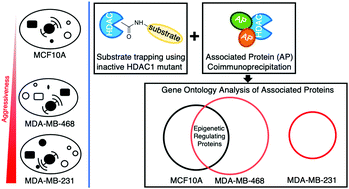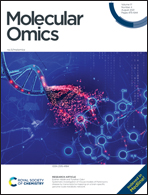Differential profiles of HDAC1 substrates and associated proteins in breast cancer cells revealed by trapping†
Abstract
Histone deacetylase (HDAC) proteins, which regulate the acetylation state of proteins, are the targets of multiple clinical drugs for cancer treatment. Due to the heterogeneity of tumors, HDAC proteins play different roles in the progression of various cancer types. For example, MDA-MB-468 and MDA-MB-231 cells are both triple negative breast cancer cells but belong to different subtypes that display different response to HDAC inhibitor drugs. To investigate the role of HDAC proteins in breast cancer, the substrate and associated proteins of HDAC1 in MDA-MB-231, MDA-MB-468, and a normal breast epithelial cell line, MCF10A, were analyzed using substrate trapping mutants and proteomics-based mass spectrometry. All three cell lines demonstrated nonoverlapping substrate protein profiles. While both normal MCF10A and cancerous MDA-MB-468 cell lines contained similar HDAC1 associated proteins, including proteins associated with epigenetic and RNA processing mechanisms, the HDAC1 associated protein profile of MDA-MB-231 cells was devoid of expected epigenetic proteins. The variable associated protein profiles of MDA-MB-231 and MDA-MB-468 suggest that HDAC1 plays distinct roles in breast cancer cell biology, which might affect cancer aggressiveness and HDAC inhibitor sensitivity.



 Please wait while we load your content...
Please wait while we load your content...